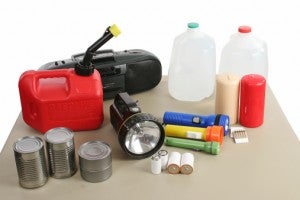Preparing for a Disaster #1
 Are you prepared for a disaster? What if there is a hurricane, fire, earthquake or tornado?
Are you prepared for a disaster? What if there is a hurricane, fire, earthquake or tornado?
Are you ready? I want to begin to share some suggestions with you. In terms of my background in this area, I have been Red Cross trained and am a member of my local Medical Service Corps. I am also chair of my local psych association’s Disaster Response Network.
First, you should contact your local American Red Cross chapter. It should be on the American Red Cross web site or in your telephone book. If your county has a 211 number for social service information, you should contact them to find out your local chapter’s address and phone number. Your chapter will have many suggestions for you. They include an emergency preparedness kit and classes on disaster preparedness. It will also run classes on CPR and have training for you to volunteer with them. You should try to follow your local chapter’s recommendations for what you need in terms of water, food, lighting, and other items. You should have radios that work on batteries and/or, cranks, and solar power.
Second, you need to set up an emergency plan to keep in contact with your family and friends. This plan should include escape routes from your house/apartment and neighborhood. You should remember that cell phones will not necessarily work in an emergency because cell service may not exist. Land lines are better—they are less likely to go out. The Internet and Wi-fi may also not exist or be sporadic. So, you need to figure out how you will keep in contact with people and where you might be able to meet that is safe. You might designate a friend or relative who lives outside of your disaster zone for everyone to contact in case you get separated.
Third, if you have any kind of medical or psychiatric condition, you need to figure out how you will keep in touch with your doctors, therapists, and pharmacists. You should discuss beforehand what you and they will do. You should particularly think about your medications. Do you have an extra supply if you can’t get access to your doctor or pharmacist? You may be especially vulnerable if your health plan will not allow you to order a reserve supply. You and each person in your family should have a list of your medications, conditions, and allergies should they be necessary.
Fourth, do you have an elderly or special needs person in your household who may have even more needs? You should be making plans with their relevant caregivers about their needs in an emergency.
Fifth, do you have a reserve supply of ready cash if the electricity is down and ATMs and banks are closed? These are some initial thoughts—more to follow.


